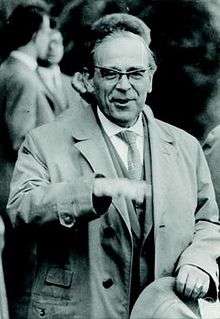Willi Rinow

Willi Ludwig August Rinow (February 28th, 1907 in Berlin – March 29th, 1979 in Greifswald) was a German mathematician who specialized in differential geometry and topology. Rinow was the son of a schoolteacher. In 1926, he attended the Humboldt University of Berlin, studying mathematics and physics under professors such as Max Planck, Ludwig Bieberbach, and Heinz Hopf. There, he received his doctorate in 1931 (Über Zusammenhänge zwischen der Differentialgeometrie im Großen und im Kleinen, Math. Zeitschrift volume 35, 1932, page 512). In 1933, he worked at the Jahrbuch über die Fortschritte der Mathematik in Berlin. In 1937, he joined the Nazi Party.[1] During 1937—1940, he was an editor of the journal Deutsche Mathematik. In 1937, he became a professor in Berlin and lectured there until 1950. His lecturing was interrupted because of his work as a mathematician at the Oberspreewerk in Berlin (a producer of radio and telecommunications technology) from 1946 to 1949.
In 1950, he became a professor at the University of Greifswald. He retired in 1972.
The Hopf–Rinow theorem is named after Hopf and Rinow.
In 1959, he became the director of the Institute for Pure Mathematics at the German Academy of Sciences at Berlin and president of the German Mathematical Society.
Publications
- Die innere Geometrie der metrischen Räume, Springer 1961[2]
- Lehrbuch der Topologie, Berlin, Deutscher Verlag der Wissenschaften 1975
- Rinow Über Zusammenhänge der Differentialgeometrie im Großen und Kleinen, Mathematische Zeitschrift, volume 32, 1932, page 412, Dissertation
Further reading
- Renate Tobies: Biographisches Lexikon in Mathematik promovierter Personen, 2006
References
- ↑ Harry Waibel: Diener vieler Herren : Ehemalige NS-Funktionäre in der SBZ/DDR. Lang, Frankfurt am Main 2011 ISBN 978-3-631-63542-1 page 270
- ↑ Green, Leon W. (1963). "Review: Die innere Geometrie der metrischen Räume by Willi Rinow" (PDF). Bull. Amer. Math. Soc. 69 (2): 210–212. doi:10.1090/s0002-9904-1963-10916-7.